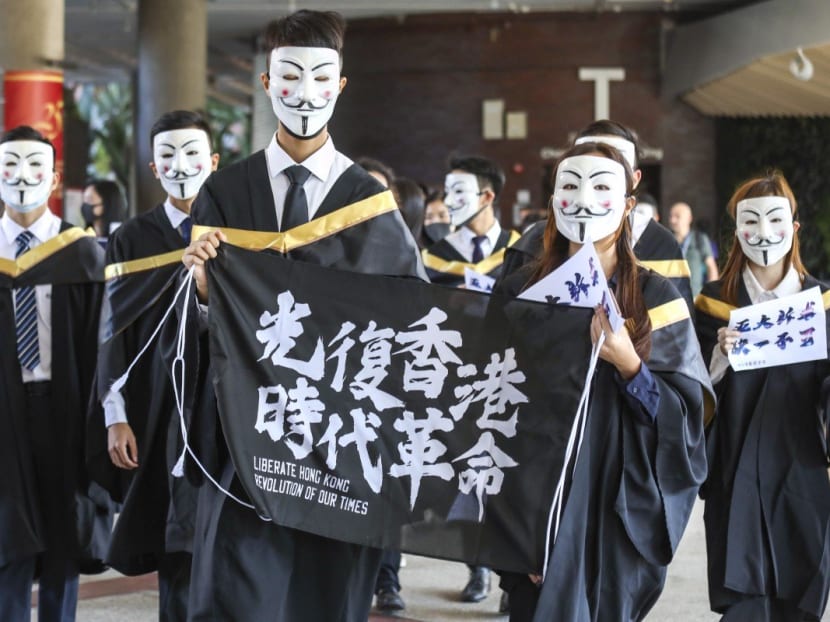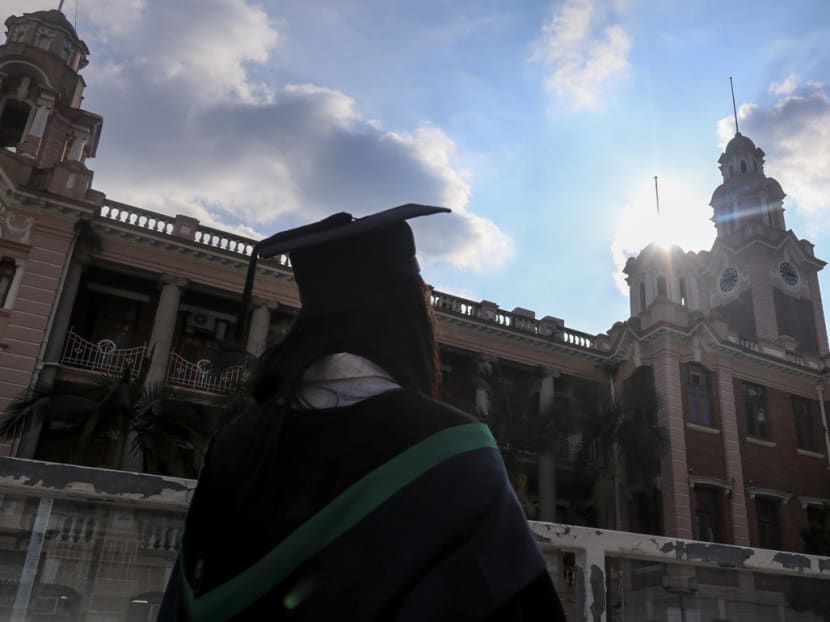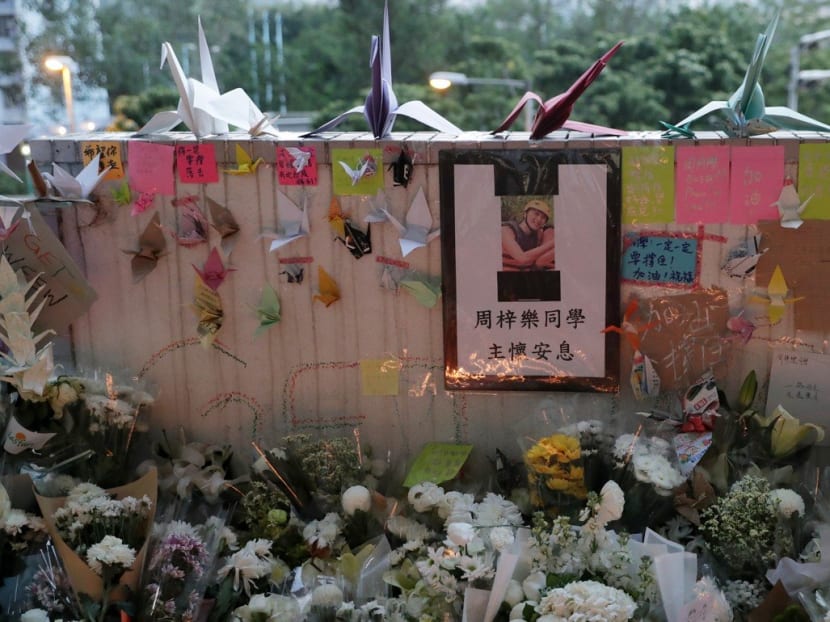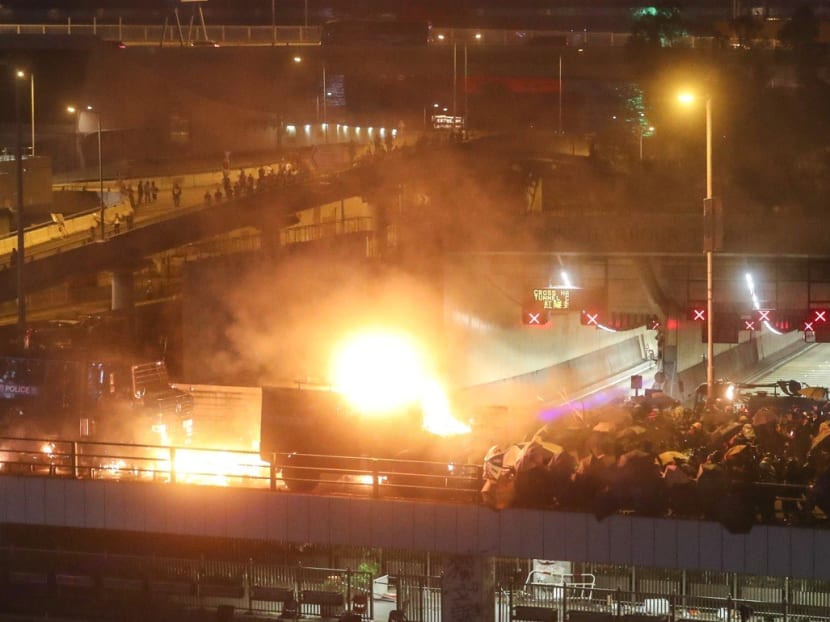Born in 1997, Hongkongers aged 22 say they're a 'cursed generation'
A series of unfortunate events, from sickness to protests and violence, have left some branding those born in 1997 a “cursed generation”. Others prefer to dub them the “chosen generation”.

Hong Kong Polytechnic University students wear Guy Fawkes masks and chant slogans before their graduation ceremony on Nov 5.
HONG KONG — Ms Wong, 22, collected her cap and gown early, and was looking forward to graduating in December from the University of Hong Kong.
But as campuses became a flashpoint for violent protests, her university called off its graduation ceremonies. Other universities have also cancelled or delayed their graduation events.
For Ms Wong, this has been the story of her life.
In 2003, her kindergarten graduation ceremony was cancelled because of the deadly Sars epidemic that swept Hong Kong and several countries worldwide.
In 2009, her primary school graduation ceremony was postponed when Hong Kong schools were ordered shut after 12 students at one school contracted the swine fever virus.
She graduated from secondary school as planned in the summer of 2015, but prepared for her public exams the year before amid the Occupy protests, which shut down parts of Hong Kong for 79 days and resulted in a week of cancelled classes.
Ms Wong is not alone in lamenting the disruptions to her milestone events. Others who started school the same year she did were similarly affected, and they were all born in 1997, the year Hong Kong was handed back to China by the British.

Sheer bad luck? Uncanny coincidence? The series of unfortunate events, from sickness to protests and violence, have left some branding those born in 1997 a “cursed generation”. Others prefer to dub them the “chosen generation”.
For now, Ms Wong is putting aside her latest disappointment, saying: “I don’t need a ceremony to prove that I graduated.”
‘A WAY TO UNDERSTAND THE YOUNG’
Universities were thrust into the spotlight in November, when violent protests shifted from the streets to campuses.
On November 8, Chow Tsz-lok, a 22 year-old student from the Hong Kong University of Science and Technology (HKUST), died four days after falling from the third storey of a car park in Tseung Kwan O while a clash was taking place between protesters and police nearby.
Masked radicals went on a rampage at the HKUST campus, and the violence spread to City University, HKU and Polytechnic University.

HKUST, in the midst of graduation ceremonies, cancelled the rest of its events. As campuses turned into battlegrounds between masked radicals and police, more universities suspended classes and cancelled graduation ceremonies.
In a Facebook post, a blogger who goes by the pen name Ms Yu and comments on education issues, listed all the missed milestones of those born in 1997 and said it was ironic that they had been affected all the way from kindergarten to university.
“I thought putting out a timeline could draw the attention of the older generation to help them understand what the younger generation has actually been through,” she told the South China Morning Post.
Born in the 1980s and an early childhood educator for 15 years, she said most of those who follow her posts are parents and they empathise with young people.
“Although we have also lived through these past 22 years, we’ve been busy with our own lives and haven’t really thought about these experiences through the eyes of youngsters,” she said.
Ms Wong shared Ms Yu’s post on her Facebook page, commenting: “Looking back at 22 years of my life, and the fall of my home for 22 years.”
She does not remember much about the Sars epidemic, which spread to 37 countries and left 299 dead in Hong Kong alone. All she recalls is having to wear a mask outdoors and being nagged all the time to wash her hands.
But she remembers vividly how disappointed she was when all schools were ordered closed after 12 students at one school contracted the swine flu virus in June 2009.
At her school, classes were winding down and her classmates were practising a performance for their graduation ceremony, when it had to be postponed.
“I was mad because I did not want school to be suspended so close to the end of my primary school days,” said Ms Wong, who was 12 at the time.
In that time before Facebook, her classmates wrote down their contact details to share.
By the time the school held the graduation ceremony, in September that year, most students had already gone their separate ways, attending different secondary schools.
Looking back now, she said it still feels like she is missing a bookend to her childhood.
Ms Wong was in Form Six in 2014, when the Occupy protests were going on in Central, just 20 minutes from her school in the Mid-Levels district.
When the Education Bureau suspended classes for a week, she joined the sit-ins at the financial district in Admiralty. She did her homework there, between talking politics with university students and strangers.
“At that time, I was not scared of being arrested. I still think that was a very peaceful movement,” she said. The experience led her to study politics at HKU.
‘OLDER GENERATION HAD JUNE 4’
Mr Cheng, born in 1997, was also in Form 6 when he organised class boycotts during the “umbrella movement”, believing that students were at less risk when taking part in political activity and civil disobedience.
He said those experiences helped Hongkongers forge their identity, and along with that came a deep dislike of the Chinese Communist Party.
He studied business and was able to attend his graduation ceremony at the Chinese University of Hong Kong on November 7, just days before the campus clashes began.
Ms Hazel, also born in 1997, has just finished her undergraduate degree in translation from Lingnan University. Although the campus in Tuen Mun was spared the protest violence, there was controversy over pro-establishment lawmaker Junius Ho Kwan-yiu, who sits on the university council.
Mr Ho was vilified by the pro-democracy movement after he was filmed shaking hands with white-clad men believed to have been involved in a vicious attack on protesters and passengers at Yuen Long MTR station on July 21. Mr Ho was the victim of a knife attack in Tuen Mun on November 6, while campaigning for the district council elections.

Ms Hazel said she and some others in her cohort were planning to use their graduation ceremony to protest against Mr Ho and call for his removal from the university council, but the event was postponed.
“I’m mad about not being able to use my graduation ceremony as a platform to express political discontent,” said Ms Hazel.
Mr Stephen Chiu Wing-kai, chair professor of sociology at the Education University of Hong Kong, acknowledged that given the current political crisis, graduands may want to use the university ceremonies to express their views.
“A lot of graduates will tell you that the ceremony is more for their families than themselves,” he said.
He felt that the cancellations might be more disappointing for international students and mainland Chinese students, whose families have made travel arrangements to be in Hong Kong for the ceremonies.
As for whether those born in 1997 are a “cursed generation”, Mr Chiu recalled that he received his master’s degree from Princeton University, in the United States, around the time of the bloody military crackdown on student protesters at Beijing’s Tiananmen Square on June 4, 1989.
He had helped to set up a booth on campus to raise awareness about the students in Beijing who were fighting for democracy and criticising corruption before the military arrived and hundreds, perhaps thousands, died.
He had a graduation ceremony, and he attended it. “I went home that day and watched the news about what happened on June 4,” he said.
Some may regard those born in 1997 as a “cursed generation” but Mr Chiu said: “Other cohorts also had their fair share of unfortunate events.” SOUTH CHINA MORNING POST






